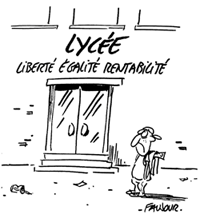
 Such is our age. Moralists call for a search for meaning, politicians have made good governance their leitmotif and the priests of globalisation are concerned only with profit – education is henceforth depicted as an investment in “human capital”.
Such is our age. Moralists call for a search for meaning, politicians have made good governance their leitmotif and the priests of globalisation are concerned only with profit – education is henceforth depicted as an investment in “human capital”.
A very recent terminology cloaks education in politics, the speeches of politicians and the reports of technocrats. Everyone now knows that education is something that is “managed”. Let’s have a look. More
“When it comes to trade liberalisation, higher education is not a product like bananas or cars”
This remark was made by Stamenka Uvalic-Trumbic, member of the higher education division of UNESCO, quoting John Daniel the assistant-director of education within the same organisation. UNESCO was reacting to the first Forum on Trade in Educational Services, which took place in Washington last May.
According to Ms Uvalic-Trumbic the tendency to commercialise what many previously considered as public goods - education, culture and information - jeopardises the mechanisms of control within these areas and demands new approaches to the protection of the rights of the individual. More
Marketing education services, “vouchers” allowing American parents to “buy” their children’s education, decreasing public education funds in a number of countries, businesses financing education... These are just some of the many advanced signs indicating a willingness to liberalise education, a huge market today, worth some 2000 millions of US dollars. More
